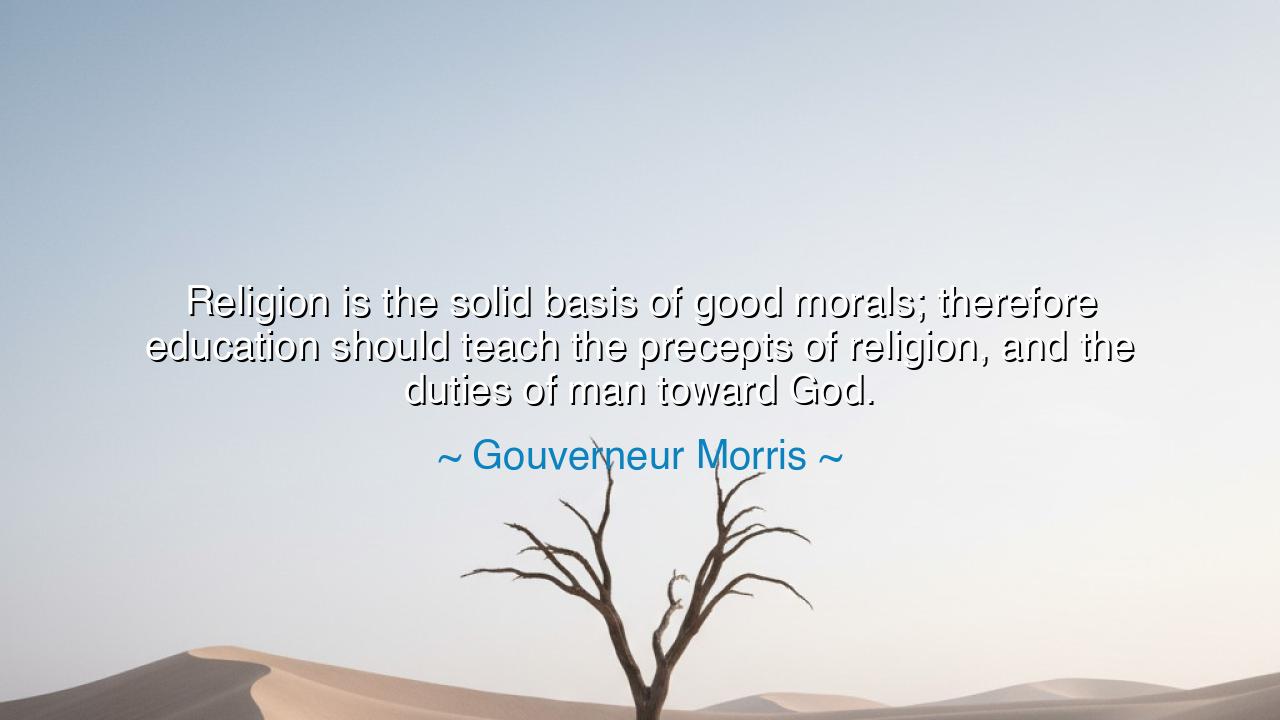
Religion is the solid basis of good morals; therefore education
Religion is the solid basis of good morals; therefore education should teach the precepts of religion, and the duties of man toward God.






Gouverneur Morris, with words carved like pillars into the temple of time, declared: “Religion is the solid basis of good morals; therefore education should teach the precepts of religion, and the duties of man toward God.” In this utterance, there is the echo of ancient wisdom, the cry of prophets, and the call of sages. For what is morality without foundation? It is a house built upon shifting sands, ready to collapse with the first great storm. But when bound to the eternal, to the divine, morality stands like the immovable rock that no tide nor tempest can overthrow.
The ancients knew this truth. When Lycurgus, the lawgiver of Sparta, sought to form a people of unbreakable will, he did not build merely upon laws, but upon reverence for the gods. When Moses descended from Sinai with commandments engraved in stone, he was not giving Israel mere rules, but divine precepts infused with fire and authority. Morris, walking in their footsteps, understood that religion is not a garment for the Sabbath only, but the very thread that weaves together the fabric of a righteous life.
Consider the story of George Washington at Valley Forge. In the bitter cold, surrounded by hunger and despair, the commander of a fragile army bent his knees in prayer. Those who beheld him testified that he sought strength not from flesh, but from the Almighty. And behold, from that faith arose endurance, from endurance arose victory, and from victory arose a new nation. What was seen there? That good morals—courage, patience, and fidelity—were strengthened by the spirit of religion. Washington’s prayer became a weapon as sharp as any sword.
Let us not imagine, children of the future, that education alone, stripped of reverence, can form noble souls. Knowledge without virtue is like a sword in the hand of a madman—powerful, dazzling, yet dangerous. The ancients taught their youth poetry, history, and music, but always with hymns to the gods, that their minds be lifted beyond themselves. For what is the duty of man if not to walk humbly before God, to do justice, and to love mercy? When these truths are written upon the heart, then education blossoms not into pride, but into wisdom.
And yet, hear also the warning: societies that cast aside the divine as superstition often find their morals unraveling like a frayed rope. Rome, when it forgot its altars and mocked its priests, fell into corruption so deep that its empire rotted from within. Its legions remained mighty, but its soul grew hollow, and thus the barbarians swept it away. Here lies Morris’s teaching—without religion, morality weakens; without morality, nations perish.
Therefore, let us hold fast to the lesson: education must not be a mere accumulation of facts, nor a contest of cleverness, but a training of the heart as well as the mind. Let it teach the duties of man toward God, so that in loving the divine, men may learn to love their neighbors. A child who learns reverence learns respect; one who learns gratitude learns generosity; one who learns prayer learns humility. These are the foundations of peace and justice in any society.
So, O listener, take this counsel into your life: let your education be not only of the eyes and ears, but of the soul. Read the sacred texts of your faith with the same zeal you study history or science. Practice daily the virtues they command—charity, honesty, self-restraint. Seek in prayer, meditation, or reflection the strength that no book alone can give. For in doing so, you will not only build your own character upon rock, but also strengthen the pillars of your family, your community, and your nation.
And remember always: wisdom without reverence is arrogance, but wisdom with reverence is light. Go, then, and let your education shine with the brightness of both reason and faith, that future generations may walk in the radiance of your example.






AAdministratorAdministrator
Welcome, honored guests. Please leave a comment, we will respond soon